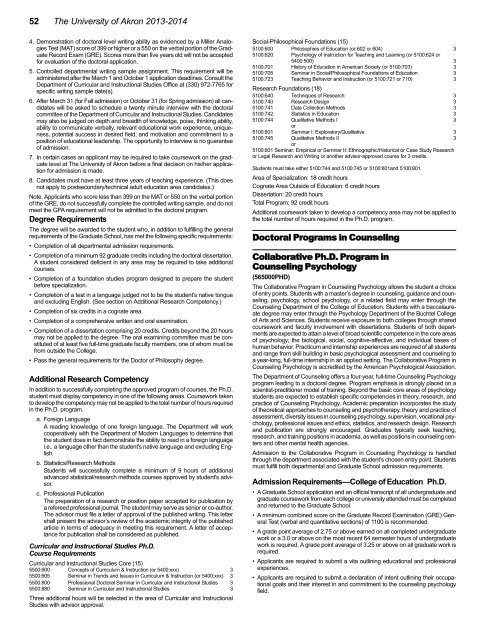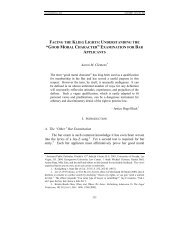2013-2014 GRADUATE BULLETIN - The University of Akron
2013-2014 GRADUATE BULLETIN - The University of Akron
2013-2014 GRADUATE BULLETIN - The University of Akron
Create successful ePaper yourself
Turn your PDF publications into a flip-book with our unique Google optimized e-Paper software.
52 <strong>The</strong> <strong>University</strong> <strong>of</strong> <strong>Akron</strong> <strong>2013</strong>-<strong>2014</strong><br />
4. Demonstration <strong>of</strong> doctoral level writing ability as evidenced by a Miller Analogies<br />
Test (MAT) score <strong>of</strong> 399 or higher or a 550 on the verbal portion <strong>of</strong> the Graduate<br />
Record Exam (GRE). Scores more than five years old will not be accepted<br />
for evaluation <strong>of</strong> the doctoral application.<br />
5. Controlled departmental writing sample assignment. This requirement will be<br />
administered after the March 1 and October 1 application deadlines. Consult the<br />
Department <strong>of</strong> Curricular and Instructional Studies Office at (330) 972-7765 for<br />
specific writing sample date(s).<br />
6. After March 31 (for Fall admission) or October 31 (for Spring admission) all candidates<br />
will be asked to schedule a twenty minute interview with the doctoral<br />
committee <strong>of</strong> the Department <strong>of</strong> Curricular and Instructional Studies. Candidates<br />
may also be judged on depth and breadth <strong>of</strong> knowledge, poise, thinking ability,<br />
ability to communicate verbally, relevant educational work experience, uniqueness,<br />
potential success in desired field, and motivation and commitment to a<br />
position <strong>of</strong> educational leadership. <strong>The</strong> opportunity to interview is no guarantee<br />
<strong>of</strong> admission.<br />
7. In certain cases an applicant may be required to take coursework on the graduate<br />
level at <strong>The</strong> <strong>University</strong> <strong>of</strong> <strong>Akron</strong> before a final decision on his/her application<br />
for admission is made.<br />
8. Candidates must have at least three years <strong>of</strong> teaching experience. (This does<br />
not apply to postsecondary/technical adult education area candidates.)<br />
Note: Applicants who score less than 399 on the MAT or 550 on the verbal portion<br />
<strong>of</strong> the GRE, do not successfully complete the controlled writing sample, and do not<br />
meet the GPA requirement will not be admitted to the doctoral program.<br />
Degree Requirements<br />
<strong>The</strong> degree will be awarded to the student who, in addition to fulfilling the general<br />
requirements <strong>of</strong> the Graduate School, has met the following specific requirements:<br />
• Completion <strong>of</strong> all departmental admission requirements.<br />
• Completion <strong>of</strong> a minimum 92 graduate credits including the doctoral dissertation.<br />
A student considered deficient in any area may be required to take additional<br />
courses.<br />
• Completion <strong>of</strong> a foundation studies program designed to prepare the student<br />
before specialization.<br />
• Completion <strong>of</strong> a test in a language judged not to be the student’s native tongue<br />
and excluding English. (See section on Additional Research Competency.)<br />
• Completion <strong>of</strong> six credits in a cognate area.<br />
• Completion <strong>of</strong> a comprehensive written and oral examination.<br />
• Completion <strong>of</strong> a dissertation comprising 20 credits. Credits beyond the 20 hours<br />
may not be applied to the degree. <strong>The</strong> oral examining committee must be constituted<br />
<strong>of</strong> at least five full-time graduate faculty members, one <strong>of</strong> whom must be<br />
from outside the College.<br />
• Pass the general requirements for the Doctor <strong>of</strong> Philosophy degree.<br />
Additional Research Competency<br />
In addition to successfully completing the approved program <strong>of</strong> courses, the Ph.D.<br />
student must display competency in one <strong>of</strong> the following areas. Coursework taken<br />
to develop the competency may not be applied to the total number <strong>of</strong> hours required<br />
in the Ph.D. program.<br />
a. Foreign Language<br />
A reading knowledge <strong>of</strong> one foreign language. <strong>The</strong> Department will work<br />
cooperatively with the Department <strong>of</strong> Modern Languages to determine that<br />
the student does in fact demonstrate the ability to read in a foreign language<br />
i.e., a language other than the student's native language and excluding English.<br />
b. Statistics/Research Methods<br />
Students will successfully complete a minimum <strong>of</strong> 9 hours <strong>of</strong> additional<br />
advanced statistical/research methods courses approved by student's advisor.<br />
c. Pr<strong>of</strong>essional Publication<br />
<strong>The</strong> preparation <strong>of</strong> a research or position paper accepted for publication by<br />
a refereed pr<strong>of</strong>essional journal. <strong>The</strong> student may serve as senior or co-author.<br />
<strong>The</strong> advisor must file a letter <strong>of</strong> approval <strong>of</strong> the published writing. This letter<br />
shall present the advisor’s review <strong>of</strong> the academic integrity <strong>of</strong> the published<br />
article in terms <strong>of</strong> adequacy in meeting this requirement. A letter <strong>of</strong> acceptance<br />
for publication shall be considered as published.<br />
Curricular and Instructional Studies Ph.D.<br />
Course Requirements<br />
Curricular and Instructional Studies Core (15)<br />
5500:600 Concepts <strong>of</strong> Curriculum & Instruction (or 5400:xxx) 3<br />
5500:605 Seminar in Trends and Issues in Curriculum & Instruction (or 5400:xxx) 3<br />
5500:800 Pr<strong>of</strong>essional Doctoral Seminar in Curricular and Instructional Studies 3<br />
5500:880 Seminar in Curricular and Instructional Studies 3<br />
Three additional hours will be selected in the area <strong>of</strong> Curricular and Instructional<br />
Studies with advisor approval.<br />
Social-Philosophical Foundations (15)<br />
5100:600 Philosophies <strong>of</strong> Education (or 602 or 604) 3<br />
5100:620 Psychology <strong>of</strong> Instruction for Teaching and Learning (or 5100:624 or<br />
5400:500) 3<br />
5100:701 History <strong>of</strong> Education in American Society (or 5100:703) 3<br />
5100:705 Seminar in Social/Philosophical Foundations <strong>of</strong> Education 3<br />
5100:723 Teaching Behavior and Instruction (or 5100:721 or 710) 3<br />
Research Foundations (18)<br />
5100:640 Techniques <strong>of</strong> Research 3<br />
5100:740 Research Design 3<br />
5100:741 Data Collection Methods 3<br />
5100:742 Statistics in Education 3<br />
5100:744 Qualitative Methods I 3<br />
or<br />
5100:801 Seminar I: Exploratory/Qualitative 3<br />
5100:745 Qualitative Methods II 3<br />
or<br />
5100:801 Seminar: Empirical or Seminar II: Ethnographic/Historical or Case Study Research<br />
or Legal Research and Writing or another advisor-approved course for 3 credits.<br />
Students must take either 5100:744 and 5100:745 or 5100:801and 5100:801.<br />
Area <strong>of</strong> Specialization: 18 credit hours<br />
Cognate Area Outside <strong>of</strong> Education: 6 credit hours<br />
Dissertation: 20 credit hours<br />
Total Program: 92 credit hours<br />
Additional coursework taken to develop a competency area may not be applied to<br />
the total number <strong>of</strong> hours required in the Ph.D. program.<br />
Doctoral Programs in Counseling<br />
Collaborative Ph.D. Program in<br />
Counseling Psychology<br />
(565000PHD)<br />
<strong>The</strong> Collaborative Program in Counseling Psychology allows the student a choice<br />
<strong>of</strong> entry points. Students with a master’s degree in counseling, guidance and counseling,<br />
psychology, school psychology, or a related field may enter through the<br />
Counseling Department <strong>of</strong> the College <strong>of</strong> Education. Students with a baccalaureate<br />
degree may enter through the Psychology Department <strong>of</strong> the Buchtel College<br />
<strong>of</strong> Arts and Sciences. Students receive exposure to both colleges through shared<br />
coursework and faculty involvement with dissertations. Students <strong>of</strong> both departments<br />
are expected to attain a level <strong>of</strong> broad scientific competence in the core areas<br />
<strong>of</strong> psychology; the biological, social, cognitive-affective, and individual bases <strong>of</strong><br />
human behavior. Practicum and internship experiences are required <strong>of</strong> all students<br />
and range from skill building in basic psychological assessment and counseling to<br />
a year-long, full-time internship in an applied setting. <strong>The</strong> Collaborative Program in<br />
Counseling Psychology is accredited by the American Psychological Association.<br />
<strong>The</strong> Department <strong>of</strong> Counseling <strong>of</strong>fers a four-year, full-time Counseling Psychology<br />
program leading to a doctoral degree. Program emphasis is strongly placed on a<br />
scientist-practitioner model <strong>of</strong> training. Beyond the basic core areas <strong>of</strong> psychology<br />
students are expected to establish specific competencies in theory, research, and<br />
practice <strong>of</strong> Counseling Psychology. Academic preparation incorporates the study<br />
<strong>of</strong> theoretical approaches to counseling and psychotherapy, theory and practice <strong>of</strong><br />
assessment, diversity issues in counseling psychology, supervision, vocational psychology,<br />
pr<strong>of</strong>essional issues and ethics, statistics, and research design. Research<br />
and publication are strongly encouraged. Graduates typically seek teaching,<br />
research, and training positions in academia, as well as positions in counseling centers<br />
and other mental health agencies.<br />
Admission to the Collaborative Program in Counseling Psychology is handled<br />
through the department associated with the student’s chosen entry point. Students<br />
must fulfill both departmental and Graduate School admission requirements.<br />
Admission Requirements—College <strong>of</strong> Education Ph.D.<br />
• A Graduate School application and an <strong>of</strong>ficial transcript <strong>of</strong> all undergraduate and<br />
graduate coursework from each college or university attended must be completed<br />
and returned to the Graduate School.<br />
• A minimum combined score on the Graduate Record Examination (GRE) General<br />
Test (verbal and quantitative sections) <strong>of</strong> 1100 is recommended.<br />
• A grade point average <strong>of</strong> 2.75 or above earned on all completed undergraduate<br />
work or a 3.0 or above on the most recent 64 semester hours <strong>of</strong> undergraduate<br />
work is required. A grade point average <strong>of</strong> 3.25 or above on all graduate work is<br />
required.<br />
• Applicants are required to submit a vita outlining educational and pr<strong>of</strong>essional<br />
experiences.<br />
• Applicants are required to submit a declaration <strong>of</strong> intent outlining their occupational<br />
goals and their interest in and commitment to the counseling psychology<br />
field.

















